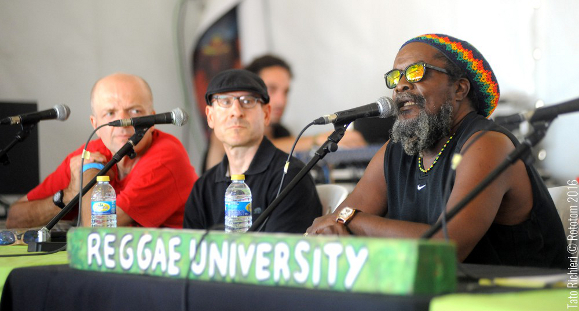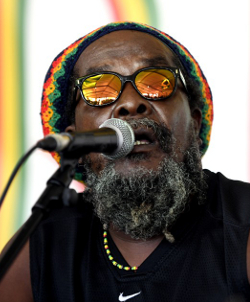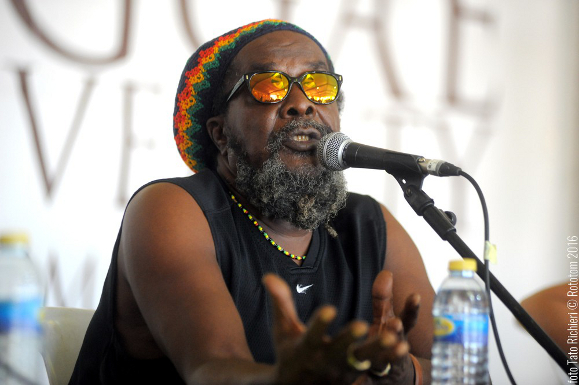Articles about reggae music, reviews, interviews, reports and more...
Revolutionary Dream - The Life and Music of Pablo Moses

Revolutionary Dream - The Life and Music of Pablo Moses
Rototom Sunsplash Reggae University day 3, a political rastaman speaks.
After two sessions of up-tempo dancehall discussion, the University changed pace to examine one of roots reggae's most subtle and thoughtful Rasta singers. Pablito Henry, better known as Pablo Moses, entered via the gangway to respectful applause, dressed in his signature zig zag pattern tam and mirror shades.

Author David Katz led the panel, reminding the gathering that this was the tenth anniversary of the University series. He introduced Pablo as “Consistently one of most unique voices in reggae. A man who had a Revolutionary Dream”, referring to his classic 1976 album produced by Geoffrey Chung.
Pablo talked about his formative years, growing up in Manchester Parish and travelling to Kingston to become a singer. He got his break late in life having tried out at the main studios Treasure Isle and Studio 1 without success. “I even camped outside to get an audition”.
In 1975 at the age of 27, he persuaded Geoffrey Chung of the Now Generation band to produce his single I Man A Grasshopper. A fellow resident of Kingston’s Vineyard Town, Chung demurred until Moses threatened to take the song to rival Chinese Jamaican Herman Chin Loy. The track, recorded in a day at Lee Perry’s Black Ark, was banned on local radio for its herb lyrics. “But the street people and the sounds played it. It reached Europe, England and the USA who could relate to it”.
 The Chin Loy-produced single We Should Be In Angola was also banned for questioning Jamaican political violence and Apartheid South Africa’s invasion of their neighbour. “At the time we had political turmoil in Jamaica - brothers shooting brothers”. He wrote the words while on scholarship to Jamaican School of Music learning the guitar. “Why fight in Jamaica when foreigners invade our homeland?”
The Chin Loy-produced single We Should Be In Angola was also banned for questioning Jamaican political violence and Apartheid South Africa’s invasion of their neighbour. “At the time we had political turmoil in Jamaica - brothers shooting brothers”. He wrote the words while on scholarship to Jamaican School of Music learning the guitar. “Why fight in Jamaica when foreigners invade our homeland?”
Moses benefitted from and supported Michael Manley’s democratic socialism programme in the 1970s. “It was a good time for Rasta and the poor. They passed the common entrance law so blacks started to infiltrate high schools of Jamaica. Rasta could go to any schools they want to. Before they had to be in gully or woods. They were trimmed and arrested. Branded the Blackheart Man. We didn't take people’s heart physically but when you sit with elders they open your mind”.
Panellist Pete Lilly from Riddim raised a crucial point “Many Rasta don't deal with politics. You’re different”. “I mostly write on social and political situations” Moses agreed “I came from a poor background”.
He deliberately used thick patois on his song Give I Fi I Name. “It means give me my real name. Elites call patois broken English but we say it's broken African because we were forced to speak English. The name Maurice Henry Smith, these are English names. I give my children African names”.
In the 1980s Moses signed to Island Records – whose owner Chris Blackwell was criticised on stage by Moses’ Rasta peer Ijahman the previous night. Despite saying he had “no regrets” about leaving due to being “signed and shelved” he was proud of the albums he cut there. On departing he recorded 1983’s politically prescient In The Future, which he claims was the first Jamaican release to use a vocoder.

Taking questions from the floor, he told the moving story of how an accident in the early 2000s left him in a coma for two weeks and unable to walk. Gradually, washing his car every day, he regained strength and returned with 2010 album The Rebirth. “I dreamed of a big green snake chasing me while flying to escape death. But Jah said it’s not your time”.
The second session of the evening was intended to showcase a more contemporary approach to roots and culture with Grammy winning reggae family Morgan Heritage. Unfortunately, this was cancelled at short notice and the University adjourned until the next day.
Read more about this topic
Comments actually desactivated due to too much spams
Browse by categories
Recommended Articles
Latest articles
Recently addedView all
© 2007-2026 United Reggae. All Rights Reserved. Reproduction in whole or in part is prohibited. Read about copyright
Terms of use | About us | Contact us | Authors | Newsletter | A-Z














